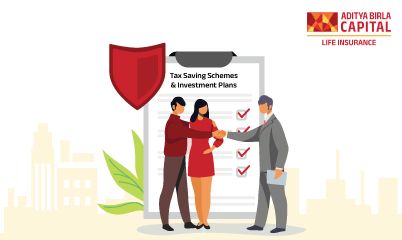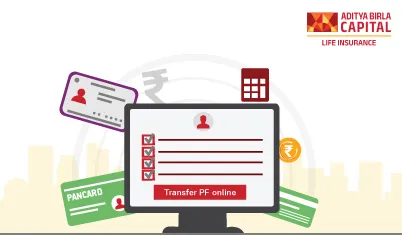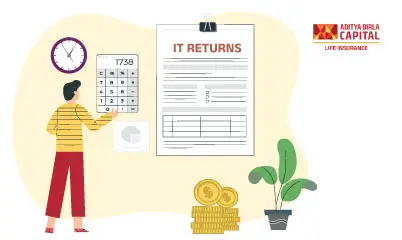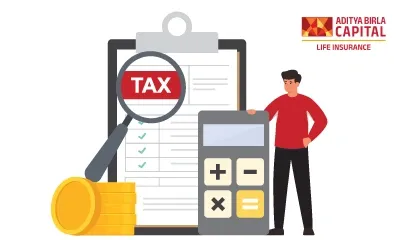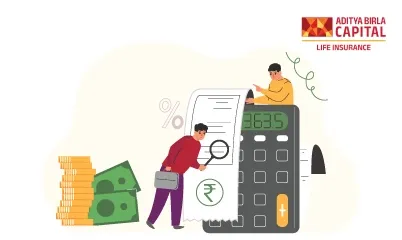Aditya Birla Sun Life Insurance Company Limited
7 ways to save taxes

Plan Smarter, Live Better!

Thank you for your details. We will reach out to you shortly.

Currently we are facing some issue. Please try after sometime.


- Table of Contents
It's that time of the year again. You know - calculating your taxes, checking if you're eligible for a refund, and more importantly, paying any income tax that may be due.
Speaking of, did you know that you could easily reduce your income tax liabilities with just a little bit of planning? Yes, that's right.
The Income Tax Act, 1961, offers taxpayers many different ways to save tax and reduce their financial burden. All you need to know is what provisions of the Act to use. And that's what we're going to help you with in this guide.
So, want to save tax? Here are 7 easy ways to do that.
Living in a rented house? Use that to your advantage.
Are you a salaried person living in a rented place? In that case, there are two provisions in the Income Tax Act, 1961 that can help you use the rent to save tax.
Section 10(13A): If your salary includes House Rent Allowance (HRA)
- Actual HRA received
- 50% of salary (if you live in a metro city) or 40% (if you live in a non-metro city)
- Rent paid minus 10% of your salary
You can deduct the [HRA exemption](https://lifeinsurance.adityabirlacapital.com/articles/income-tax/house-rent-allowance-exemption-calculation-and-regulations/) from your total income to arrive at the taxable income. Ultimately, that reduces your tax liability.
Section 80GG: If your salary does not include House Rent Allowance (HRA)
If your employer does not give you a House Rent Allowance, you can make use of section 80GG to save tax. Under this section, you can claim the least of the following as a deduction:
- Rs. 5,000 per month
- Annual rent minus 10% of total income
- 25% of total income
Repaying a home loan? Get a deduction on the interest.
Not a tenant? Don't worry. Living in your own home also comes with tax benefits* if you're currently repaying a home loan.
Thanks to section 24 of the Income Tax Act, you can get a deduction on the interest payments you make each year. Here are the details:
- You can claim the interest paid on your housing loan as a deduction - up to Rs. 2 lakhs.
- The loan should be taken for purchase or construction or repair or reconstruction of your house property.
- You can claim this deduction for two or more housing loans - or for two or more houses.
Insurance premiums can also help you save tax.
Insurance premiums are among the easiest tax-saving tools. This is true for both life insurance and health insurance.
Life insurance premiums: Section 80C of the Income Tax Act, 1961
Have a life insurance policy? You can claim the premiums you pay each year as a deduction from your total income. That will bring down your total taxable income, and thereby also reduce your tax liability. Simple as that!
Here are some key things to note here:
You can claim premium payments up to Rs. 1.5 lakhs as a deduction under this section.
Health insurance premiums: Section 80D of the Income Tax Act, 1961
The premiums you pay for health insurance plans are also deductible - as per section 80D. Here's what you should keep in mind here:
- You can claim deductions for premium paid on health insurance taken for yourself, your spouse, children or parents.
- The deduction limit is Rs. 25,000 per year - for premiums paid on policies taken for yourself or your spouse/children.
- If you have purchased health insurance for your parent(s), you can avail an additional deduction up to Rs. 25,000.
- If your parents are senior citizens, the deduction limit goes up to Rs. 50,000.
Make use of the other benefits under section 80C.
The benefits under section 80C are not just limited to insurance premiums alone. A range of other investments and expenses can also be claimed as deductions under this section. Keep in mind though, that the collective upper limit for deductions under this section is Rs. 1.5 lakhs.
Want to know more about the investments and expenses that qualify for deductions under section 80C ?Here's an illustrative list.
- Public Provident Fund (PPF):
PPF is a government-backed scheme that has a lock-in period of 15 years. - Equity Linked Savings Scheme (ELSS):
ELSS is an equity-oriented mutual fund scheme that has a lock-in period of 3 years. - National Savings Certificate (NSC):
This is another government-backed investment scheme with a lock-in period of 5 years. - Tax-saver FDs:
Tax-saver fixed deposits are just like your regular FDs, except that they have a lock-in period of 5 years. - National Pension System (NPS):
The NPS is a voluntary contributions scheme that comes with a lock-in period till you're 60 years of age. - Senior Citizens Savings Scheme (SCSS):
With a lock-in period of 5 years, the SCSS is another tax-saving investment option for senior citizens over the age of 60. - Home loan principal repayment:
If you're actively repaying a home loan, you can avail deductions under section 80C for the principal component of the loan. - Children's tuition fees:
You can also avail deductions on the tuition fees paid on your children's full-time education fees. Each taxpayer can claim this deduction up to 2 children.
Keep some money in your savings account.
Investments and expenses aside, did you know that something as simple as saving up some money in your bank account can help you save taxes?
When you keep some money in your savings bank account, you earn interest on this amount, right? Now, this interest on your savings account can be deducted from your total income - thus reducing your total taxable income.
Here are some things to keep in mind about this tax-saving provision:
- Interest on SB accounts up to Rs. 10,000 is allowed as a deduction u/s 80TTA.
- For senior citizens, the limit is Rs. 50,000 u/s 80TTB.
- The interest from all your savings bank accounts is considered for this limit.
Don't Forget the Standard Deduction.
If you're a salaried employee, you have another reason to rejoice. There is a standard deduction with a limit of Rs. 50,000 applicable for all salaried taxpayers.
You can claim this deduction from your total salary, ultimately reducing your total taxable income that way.
Check if the New Tax Regime is more Beneficial to You.
Budget 20-21 saw the introduction of an optional new tax regime. So, each year, before you file your income tax return, you can choose between the old and new tax regimes. The new regime is different in two key ways:
- It comes with lower tax rates.
- It does not allow for most of the deductions under the old tax scheme.
If you have not invested in [tax-saving schemes](https://lifeinsurance.adityabirlacapital.com/articles/income-tax/tax-saving-investment-schemes/), then you could benefit by opting for the new tax regime. That's because it gives you lower tax rates, and you wouldn't be losing out on deduction benefits anyway, since you do not have any such investments.
You can always calculate your tax liability under the old scheme and the new scheme, and choose the one that helps you save more tax.
So, there you have it - 7 easy ways to save taxes without making any elaborate financial plans. The best part is that you can make use of all of these ideas if they apply to you. There are no restrictions whatsoever. Make sure that you take these into consideration from this financial year onward, so you can save more!
TAX SAVING PLANS: TOP TAX SAVING PLANS IN INDIA THAT HELPS TO SAVE YOUR TAX BURDEN
Want to save taxes and also enjoy the benefits of insurance or investment simultaneously? Tax-saving plans may be just what you're looking for. Our blog on the top tax-saving plans in India can help you save taxes further.
Read it here
GET CASH-IN-HAND WHILE PAYING YOUR PREMIUMS - AND USE THOSE PREMIUMS TO SAVE TAXES TOO!
If you thought that insurance plans gave you benefits only after the premiums payment term, think again. With the ABSLI Vision LifeIncome Plus Plan (UIN: 109N131V01), you don't have to wait so long.
You get to enjoy guaranteed regular income PLUS cash-in-hand - even while you're still paying the premiums.
Plus, you can use those premiums to help you save tax*! Talk about three benefits in one.
Know More
Thank you for your details. We will reach out to you shortly.
Thanks for reaching out. Currently we are facing some issue.
Buy ₹1 Crore Term Insurance at Just ₹575/month1
ABSLI DigiShield Plan
Life cover up to 100 years of age.
Joint Cover Option
Inbuilt Terminal Illness Benefit
Tax Benefit^
Return of Premium Option~
Life Cover
₹1 crore
Premium:
₹575/month1
Most Popular Calculator
Guaranteed returns after a month¹
* Tax benefits are subject to changes in tax laws. Kindly consult your financial advisor for more details.
ADV/9/23-24/2045



